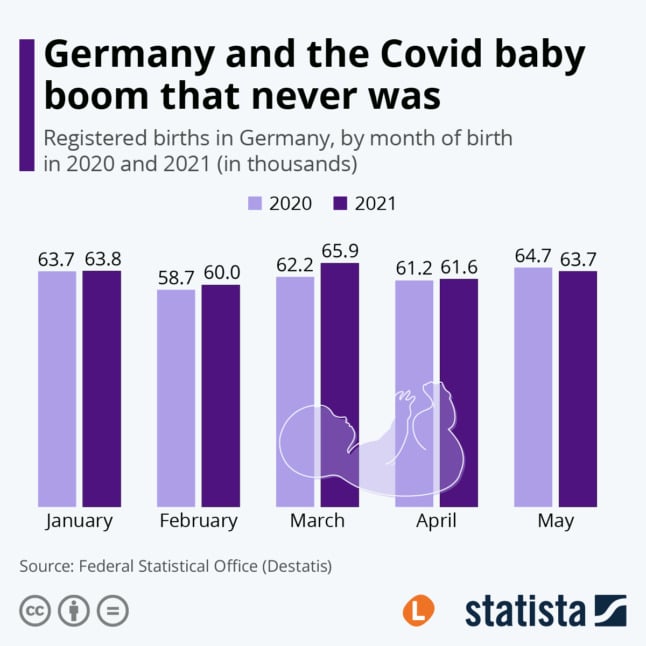They are called the ‘pandemic babies’ – the little ones born after pregnancies that started during the Covid-19 crisis.
Society predicted a baby boom across the world when many countries ordered residents to stay at home to stop the spread of the virus.
But has there really been a rush of new arrivals compared to pre-pandemic years?
What happened in Germany?
Births in the first five months of 2021 are due to pregnancies that began during Germany’s initial lockdown from late March to early May, and in May and the summer months of 2020, when pandemic-related contact restrictions were largely lifted.
According to provisional data from the Federal Statistical Office (Destatis), around 315,000 children were born in Germany from January to May 2021. This is a slight increase of 1.4 percent in the number of births compared with the same period of the previous year – not quite the boom that we were expecting.
IN NUMBERS: German birth rate falls as women have children later
However, there was a significant rise in the number of births observed in March 2021, where around 3,700 more babies (six percent increase) were born than in March 2020.
In the other months marked by the onset of the Covid pandemic, the trend has been “unremarkable” according to Destatis.

Olga Pötzsch, demography expert at the Federal Statistical Office, said experts were “unable to detect any striking changes in the birth rates” from January to May 2021.
“The coronavirus measures and their relaxation in the first half of 2020 do not appear to have had an immediate impact on family planning,” said Pötzsch.
“During the first lockdown and also in the summer months, neither significantly more nor significantly fewer children were conceived than in 2019.”
Why was there a boom in March?
The only striking trend found so far is March 2021 when 65,900 births were registered in Germany – up six percent on the previous year.
Nine months before, Germany started relaxing the Covid measures after the first lockdown which involved tough contact restrictions. This seems to have prompted some, ahem, celebrations.
READ ALSO: What’s the advice for sex and dating in Germany during the coronavirus crisis?
“These births are mainly due to pregnancies that started with the flattening of the first Corona wave and with the relaxation of contact restrictions from the beginning of May 2020,” Pötzsch explains.
What about the people becoming parents in Germany?
Key characteristics of parenthood in Germany changed only slightly year-on-year in the first five months of 2021.
For example, 32 percent of parents who had babies during this time were not married, compared with 33 percent in the same period in 2020.
Of all births from January to May 2021, 46 percent was the mother’s first baby, 36 percent was the second, and 18 percent was the third or more.
This is consistent with the composition of births in the same period last year. But the proportion of births to mothers with German citizenship was slightly higher (77 percent) than in the same period in 2020 (75 percent).
So will we see a baby boom representing the relaxation of measures earlier this year? Time will tell.
READ ALSO: Are more babies being born in Germany amid the pandemic?
Vocabulary
Birth rate – (die) Geburtenrate
Pregnancy – (die) Schwangerschaft
Parenthood – (die) Elternschaft
Trend/development – (die) Entwicklung
We’re aiming to help our readers improve their German by translating vocabulary from some of our news stories. Did you find this article useful? Do you know any stories of pandemic babies? Let us know.



 Please whitelist us to continue reading.
Please whitelist us to continue reading.
Member comments